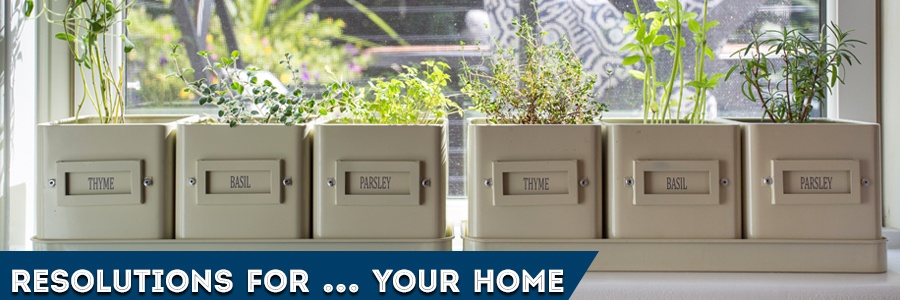Year in and year out, folks from all walks of life make New Year’s resolutions to better themselves, and, as often as not, end up breaking them before January becomes February.
Rather than offer you a laundry list of resolutions you should make, we've offered some great reasons why the typical resolutions are important and beneficial. It might be just what you need to look back in a year and think, "I did it!"

When most people decide to bolster their exercise regime, they’re well aware of the obvious physical benefits of weight loss, lower cholesterol levels, increased energy and muscle tone. But exercising has much, much more to offer. In fact, the emotional benefits might even outnumber the physical ones, as exercising helps to improve the functionality of the human brain. Thus, more exercise can mean less stress, greater self-confidence and a decreased risk of cognitive decline. Now that's a great reason to strap on those sneakers!
2. Eat HealthierAgain, most of us are aware that healthy eating will help reel in the expanded waistlines acquired during the holiday season. But there’s more to eating well than looking good. Foods filled with vitamin D, for example, can help ward off depression — especially important in the winter, when dark days can lead to doldrums. Why not start your healthy eating resolution with a bite-sized commitment (pun intended) to starting each day with a healthy breakfast, which many experts agree can set the stage for healthy eating and good habits throughout the day.
3. Read MoreReading offers obvious education and relaxation benefits, but did you know it also acts to stimulate the brain in a way that can lower the risk of Alzheimer’s and dementia down the road? Reading fiction especially helps you detach from the stresses of everyday life, while plot twists and turns improve memory. This relaxing exercise also helps you practice and maintain focus and concentration, which can reap benefits elsewhere in life.
4. MeditateMany look to meditation as a way to improve focus and clarity, but studies show that meditating can have far-reaching effects that can include a reduction in depression and anxiety, and a host of other mental health benefits. General stress is kept at bay, and meditation has even been shown to help manage physical pain and fight off illness. If you'd like to reap the rewards of improved health — both physical and mental — try these 20 tips for starting a meditation practice in 2017.
5. Adopt a PetEveryone who's considered acquiring a pet — whether it dons fur, scales or feathers — is aware of the joy animal roommates can bring. But they also provide a long list of other benefits to their owners far beyond entertainment value. Both dogs and cats help your body build up immunities to illnesses and decrease allergies, and pets of all kinds lessen loneliness and give purpose. After all, even a fish needs to be fed each day.

So many people make New Year’s resolutions for bettering themselves, but a major contributor to happiness and personal well-being is your dwelling. At its best, a home should be welcoming, comfortable and relaxing for both you and your friends and family.
1. Dispense with Holiday Decorations
The wreaths, garlands, menorahs and candles you fished out from closets and attics truly do enhance the holly, jolly mood of the season, and you can get a jump-start on next year's holiday decor by smartly storing those items this year. Specially designed wreath containers, partitioned ornament boxes, Christmas light spools and more make packing these items away super-easy. And, if your holiday décor and storage needs (or budget) are more modest, Apartment Therapy offers up some amazing DIY hacks as well.
2. Condense the Clutter
Winter weather has a tendency to trap us indoors during the holidays, making it the perfect time to clear clutter. Apply some DIY magic to your efforts, and you'll save money while beautifying your home and simplifying your life — bonus! We love these 100 recommendations from Redbook and Lifehack can always be counted on for great organizing tips. From corralling cords to tackling tools, clutter-free living is stress-free living.
3. Give Away Clothing and Goods
After condensing clutter, you'll no doubt have items perfectly suitable for donation. Aside from cleaning up your home and helping those in need, did you know that the simple act of giving reaps enormous benefits to your personal health and well-being? Where you donate is up to you and your interests, of course, and a little internet research can point you in the right direction.
4. Create a Cleaning Calendar
Once you've decluttered and donated, you're on a roll. In order to keep that momentum throughout the new year, why not rally the entire family and plot out a regular cleaning schedule. Look to the experts at Better Homes & Gardens and Good Housekeeping for tips.
5. Greet the Great Outdoors
Don't stop with your interiors — new year's planning can benefit your outdoor spaces as well. Do you have backyard, garden, balcony or even a window planter box? If so, this is the perfect time to begin orchestrating its springtime reveal. U.K.-based seed company Thompson & Morgan offers a great calendar of gardening chores and plants to address by month. (Did you know that January is the perfect time to begin sowing pansies and begonia indoors?) And remember that any time spent planning your outdoor space could, literally, bear fruit come spring!

Perhaps you'd like to travel or pay down lingering debt in 2017. Or maybe you’d love to splurge on that vacation condo or finally outfit that home gym. Whatever your spending and saving goals are for the new year, the first step is getting your finances in order
1. Set a Budget
From Reader’s Digest to Lifehacker, source after source asserts that crafting a budget is the first step towards financial stability and contentment. No matter whose advice you follow, creating a budget boils down to three steps: 1) Adding up what you earn.
2) Tallying up what you spend. 3) Reconciling the two, which may mean trimming your expenses or boosting your income.
2. Build up Emergency Reserves
You've taken the time to craft a budget that leaves you with a bit of savings each month — congratulations! The real challenge, however, is sticking to that budget each month, no matter what.
The key to adhering to your financial plan is setting aside emergency funds for life's pesky surprises. Anything from a bad fuel pump to Fido's persistent tummy troubles can quickly add up to financial trouble, and a layoff or illness could lead to downright disaster if you don't have emergency reserves. Most experts recommend accumulating at least 6 months of living expenses in savings. That's a lofty goal for most, but if you can allocate about 15 percent of your monthly earnings to savings, you can reach that summit in just over three years — and that doesn't include potential interest or investment returns (see below).
3. Destroy Debt
If you owe money on car notes, credit cards or student loans, the thought of tackling that debt can seem overwhelming. Many financial professional agree that tackling the highest interest debts first makes the most money sense. We'd also suggest knocking out any small debts you can — say a credit card with a $200 balance — to stop accumulating interest while giving yourself the immediate satisfaction of zeroing out a debt. Feels good, doesn't it?
Can't decide whether to tackle debt or emergency savings first? That depends on your specific financial situation, of course, but one good approach is to start with collecting a small emergency fund of around $1,000, then aggressively paying down debt before returning to savings. That approach will help you get past moderate spending surprises while keeping your debt reduction plan on track.
4. Put Your Money to Work
Making your money work for you is a great way to bolster your net worth. If you can afford to make a bit of your long-term savings less accessible, divert that cash to a retirement account, college fund, stocks, bonds or other options that meet your personal goals. Be sure to accurately assess the amount of risk you can afford, and always consult the a financial professional for guidance.
5. Tackle Taxes
We know you've barely raised your glass of egg nog, but trust us, this is the perfect time to begin assessing your 2016 tax situation. Have you set up your 2017 tax software or tapped an accountant to handle the job? Do your employer or clients have your current address to send tax documents? Have you tracked your deductions and organized receipts? Trust us, on April 18 (Tax Day is later in 2017 due to the weekend … you're welcome!), you'll be happy you set aside a little of your hard-earned time off to tax prep this holiday season.
 201 366 8692
201 366 8692







![The Five Must-Check Apartment Sites for Renters [Updated in 2019]](https://www.dixonleasing.com/hubfs/Homes%20by%20Dixon%20Images/Rent%20Savvy/RentSavvy_MustCheckSites_Large.jpg)

